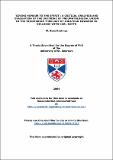Files in this item
'Giving honour to the Spirit' : a critical analysis and evaluation of the doctrine of pneumatological union in the Trinitarian theology of Jonathan Edwards in dialogue with Karl Barth
Item metadata
| dc.contributor.author | Hastings, W. Ross | |
| dc.coverage.spatial | 308 | en_US |
| dc.date.accessioned | 2012-06-08T14:54:04Z | |
| dc.date.available | 2012-06-08T14:54:04Z | |
| dc.date.issued | 2004 | |
| dc.identifier | uk.bl.ethos.542352 | |
| dc.identifier.uri | https://hdl.handle.net/10023/2707 | |
| dc.description.abstract | The extent to which the 'honour' of the Spirit influenced the theology of Jonathan Edwards is a hitherto underdeveloped theme. Against a backdrop of Patristic thought and in dialogue with the theology of Karl Barth, evaluation is made of pneumatological union in Edwards' Trinitarian theology as this centres on the nature and inter-relatedness of the 'three unions' that characterize his theology: the union of the three Persons of the Trinity, the union of the saints with God, and the union of the divine and human natures of Christ. Edwards' seeks to honour the Spirit as the mutual love of the Father for the Son within his Augustinian, Lockean model of the immanent Trinity, and as 'Person' in the economy. The challenges of doing so within the limits of this psychological model of the Trinity are evaluated in dialogue with the Cappadocian Fathers and Barth. In a manner patterned after union in the Trinity, Edwards gave prominence to the concept of the pneumatological union of the saints with God in Christ, in fulfilment of the self-glorifying purpose of God in creation and redemption. Edwards' experiential theology of conversion, and his elevation of subjective sanctification by the Spirit over objective justification in Christ, for assurance, is contrasted with Barth's greater emphases on the Christological union of God with humanity and objective justification in Christ. Barth's more contemplative approach is contrasted with the overly introspective spirituality of Edwards. Edwards' view of the role of the Spirit in the hypostatic union of God with humanity in Christ, which is reflective of the other unions, is also evaluated in light of Patristic, Reformed-Puritan and Barthian thought on the nature of the humanity Christ assumed, and the doctrine of the vicarious humanity of Christ. A more emphatic incarnational emphasis may have saved Edwards' Spirit- honouring spirituality from an anthropocentricity which is ironical given that the glory of God is his ontic doxological concern. | en_US |
| dc.language.iso | en | en_US |
| dc.publisher | University of St Andrews | |
| dc.subject.lcc | BX7620.E3H28 | |
| dc.subject.lcsh | Edwards, Jonathan, 1703-1758--Contributions in theology of the Holy Spirit | en_US |
| dc.subject.lcsh | Barth, Karl, 1886-1968 | en_US |
| dc.subject.lcsh | Holy Spirit--History of doctrines--18th century | en_US |
| dc.subject.lcsh | Trinity--History of doctrines--18th century | en_US |
| dc.title | 'Giving honour to the Spirit' : a critical analysis and evaluation of the doctrine of pneumatological union in the Trinitarian theology of Jonathan Edwards in dialogue with Karl Barth | en_US |
| dc.type | Thesis | en_US |
| dc.type.qualificationlevel | Doctoral | en_US |
| dc.type.qualificationname | PhD Doctor of Philosophy | en_US |
| dc.publisher.institution | The University of St Andrews | en_US |
This item appears in the following Collection(s)
Items in the St Andrews Research Repository are protected by copyright, with all rights reserved, unless otherwise indicated.

